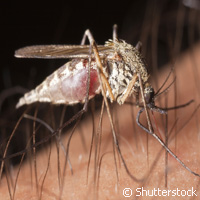How gene conversion can beat malaria in future
An international research team has shed new light on how the human genome puts up a good fight against malaria parasites. Seeking gene variants that could elucidate why some geographically and genetically diverse ethnic groups are more vulnerable to malaria than others, the scientists performed a genetic analysis of 15 ethnic groups in Africa. The study's findings are published in the American Journal of Human Genetics. Malaria is responsible for making more than 300 million people sick each year, and almost 1 million of those succumb to this deadly disease. Around 90 % of the cases are reported in sub-Saharan Africa. Scientists at the University of Pennsylvania in the United States and colleagues from France, Italy, Kenya, Nigeria, Sudan and Tanzania investigated how different populations show different responses to the parasites that cause malaria. They performed the most extensive cross-population comparison on a pair of genes related to the disease's capacity to invade red blood cells. 'When you try to identify the variants that are associated with disease susceptibility, it's important to do a very fine scale study,' says Dr Wen-Ya Ko, a postdoctoral fellow in the Department of Genetics at the Perelman School of Medicine at the University of Pennsylvania. 'Different populations evolve independently, to a certain degree, so different populations can come up with unique mutations.' According to the researchers, the life cycle of malaria is contingent on infecting red blood cells by binding to their surfaces. They suggest that this is why mutations like sickle cell anaemia, which modify the overall shape of those cells, experience positive selection. 'Both host and the parasite try to fight back with mutations; it's a co-evolution arms race that leaves a signature of selection on the genes,' Dr Ko explains. 'We've identified several single-nucleotide polymorphisms that are candidates for that signature.' Polymorphisms in particular were the focus of the study. The team put these variants in a pair of genes that code for proteins called glycophorin A and glycophorin B, which exist on the surface of red blood cells. Changes to the proteins' shape affect how the parasite causing malaria binds to them and how it infects the cells. But the researchers say two opposing theories exist as to why changes to the shape of these proteins impact the rates of malaria. Some scientists postulate that glycophorin A makes itself more attractive to binding by acting as a decoy, ensuring that pathogens do not infect more vulnerable cells. Others believe that glycophorin A mutates, making it impossible for malaria parasites to bind. The team's findings show differing patterns of natural selection acting on the different regions of the two genes. They found more genetic variation in the region of glycophorin A, which influences the entry of the malaria parasite into the red blood cell. 'This signature of selection was strongest in populations that have the highest exposure to malaria,' says Professor Sarah Tishkoff of the University of Pennsylvania and senior author of the study. The team members also discovered a novel protein variant at glycophorin B in a number of populations suffering from high malaria levels that could also be a target of natural selection, they say. 'The genes for glycophorin A and B arose through gene duplication,' Dr Ko says. 'They are more than 95 % similar to each other on the sequence level. Because they are so similar, sequences of A might bind to B during recombination, which means a mutation that occurs on one can be shared with the other.' Investigating gene conversion in the future could lead to better research and treatment to fight malaria. 'The parasite's genome is very highly mutable, and its generation time is short, as compared to humans, so having more mutations more quickly is helpful in keeping up,' Dr Ko comments. 'This is one tool in the arms race. It may not win the war, but it's another way to increase variation.'For more information, please visit:American Journal of Human Genetics:http://www.cell.com/AJHG/University of Pennsylvania:http://www.upenn.edu/
Countries
France, Italy, Kenya, Nigeria, Sudan, Tanzania, United States



